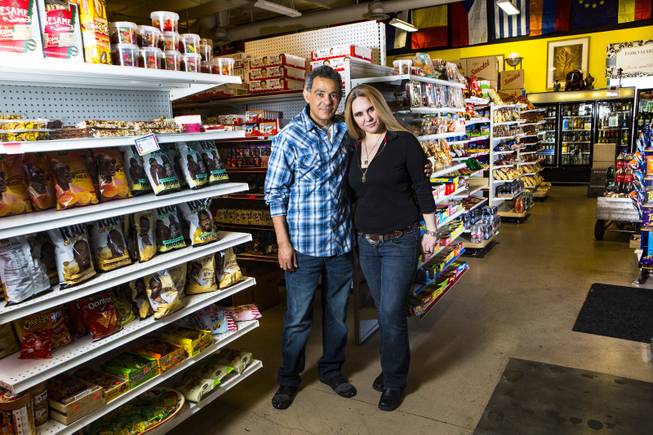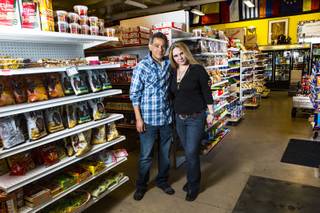
Miranda Alam/Special to Weekly
Shop owners Magdi Youssef, left, and his wife Yuliya Youssef pose for a portrait at Euro Market and Smoke Shop in Las Vegas on Friday, Feb. 22, 2019.
Saturday, April 13, 2019 | 2 a.m.
Tucked into a suburban west Las Vegas strip mall is a small family-owned shop. Its shelves brim with treasured European treats, such as strong Turkish coffee, Bosnian cookies, German chocolates, hard-to-find Greek wines and breads baked in-house. A lineup of flags hang on the wall, representing countries from which the market offers goods.
Euro Market & Smoke Shop
• Where: 5625 S Rainbow Blvd #J
• Hours of operation: Monday-Saturday, 8 a.m.-9 p.m.; Sunday, 10 a.m.-6 p.m.
• Phone: 702-464-5022
• Facebook @euromarket.deli
Yuliya Youssef cheerfully operates the front of the store, Euro Market & Smoke Shop, working as a cashier and greeting customers in a thick, warm, Russian accent.
Her husband, Magdi, saunters through the narrow aisles, straightening products on the shelves. He picks up a glass jar filled with vibrant red spread and holds it to the light. “This is Ajvar,” Magdi says, admiring the concoction. The mixture of roasted peppers, eggplant, herbs and olive oil is primarily found in the Balkans and breathes life into fish, chicken and toast by transforming them into a tangy, sweet bite.
Yuliya and Magdi bought the market space on South Rainbow Boulevard in 2016, working every day since to transform the store with beloved treats for immigrants in Las Vegas.
“When I was younger, I wanted to work at a gas station. Thank God I never did, though, because the shop is fun,” Yuliya says. “It started with nothing. There were only two aisles. None of this was here.”
Most of the items come from Eastern Europe, where the bulk of the customers have roots.
Elizabeth, a Polish immigrant and frequent customer, fills her arms with Krakus gingerbread cookies and then tears open a bag to hand a chocolate-covered, jam-filled morsel to Yuliya. “This one is very popular in Poland, you see?” Elizabeth says. After Yuliya devours the treat, Elizabeth beams with pride. “I told you, it’s tasty.”
As the shop’s co-owner, Yuliya, who immigrated to the United States after the collapse of the Soviet Union, can relate to her customers’ desire for comfort and the American dream. She fled with her family, which was being persecuted under communist rule, and recalls times when they had to wait in line during food shortages.
“It was for food when I first came here. Now it’s just to live, be healthy and wealthy—you know, to have a house, job and car. That’s it. So when I’m old, I don’t have to work like a dog,” Yuliya says.
Magdi spent his late teens and early twenties taking care of his parents in Egypt before immigrating to the U.S. for work. He hasn’t been back to visit them in more than a decade.
To remind himself of home, the shop carries Egyptian goods, such as a thick, sweet mango juice heavy with pulp, and quail that he uses to re-create a dish his mother used to make.
Yuliya and Magdi met at a club called Sharx in Minneapolis. It was ladies night, and Yuliya was the best dancer, Magdi recalls. On their second date, he said he was going to marry her.
“It was not in my plans, but hey, 20 years later and we’re still together,” Yuliya says.
They have two children who help around the shop, a 19-year-old son and a 15-year-old daughter. “I want the best for them—school, college—to be better [off] than us,” Yuliya says. “And who knows, maybe they’ll take over the shop.”
It’s not the couple’s first time running a small business. Before the Great Recession, Yuliya and Magdi operated three, including kiosks and a Hawaiian Market, but like so many other people, they lost everything.
To survive, they did odd jobs—driving taxis, selling Egyptian statues—until buying the market was possible.
Now their odd jobs consist of installing backlights on glass shelves, decorating for various holidays, cleaning and stocking and manning the shop. Yuliya and Magdi do it all without complaint, and when the traffic dies down, Yuliya often turns up the music, swaying to the beat.
They find joy running the shop, but that doesn’t mean there haven’t been troubles. This past year, the store was burglarized, causing thousands of dollars in damages. The couple didn’t have insurance, and for a month after the crime, Magdi dragged a mattress to the front where he could sleep and guard the space once it closed for the day.
“This [is] everything I have, and everything I can give my family,” Magdi says. “I’m too old to lose again.”
Magdi is hopeful that this time, he’ll be able to succeed, providing a better life for his children and operating a successful business.
“[It’s] food. I don’t have to convince anybody. They come, they know what they want, and they come again,” Magdi says. “If you have a dream, if you have something, you’re going to get up and go.”
This story originally appeared in the Las Vegas Weekly.

